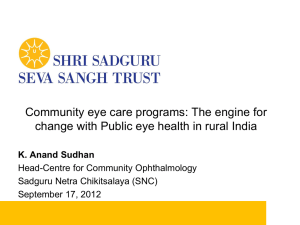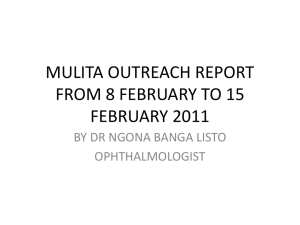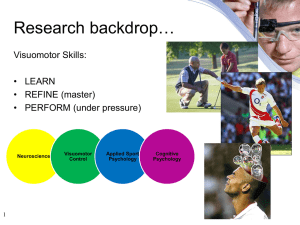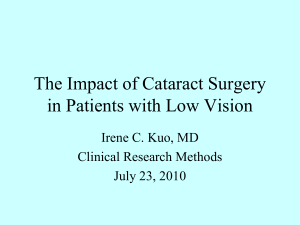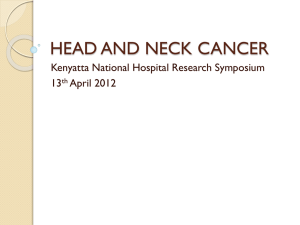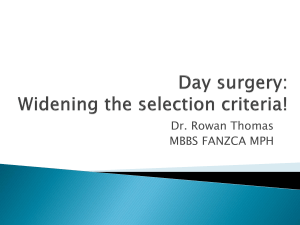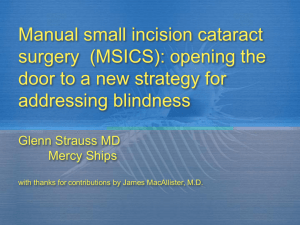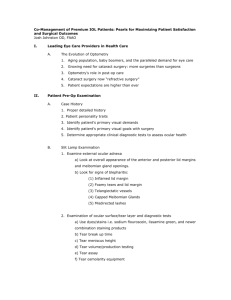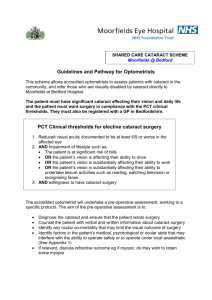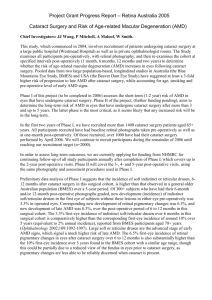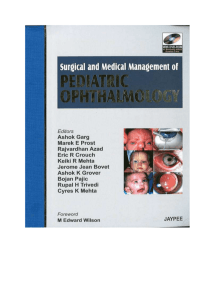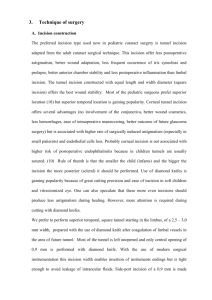Preoperative Ophthalmic nursing care
advertisement
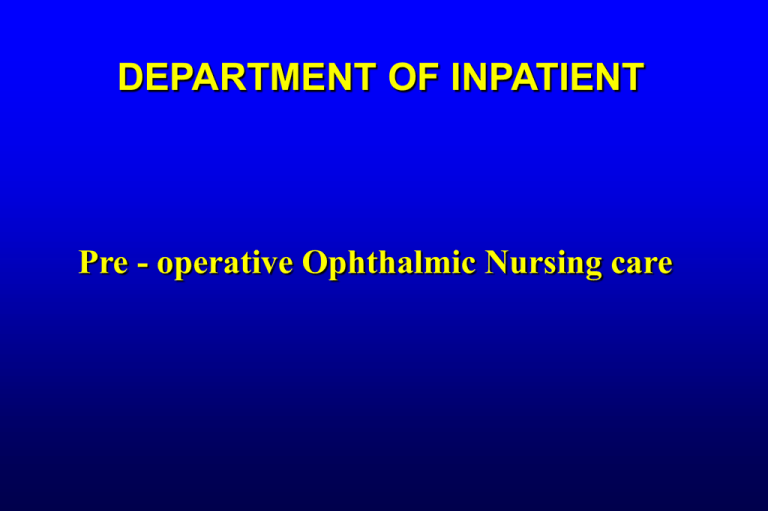
DEPARTMENT OF INPATIENT Pre - operative Ophthalmic Nursing care Preoperative Evaluation Once the patient has been admitted in the ward for surgery or treatment, as per the instructions in the case sheet, the OA has to do the necessary tests and record them in the case sheet. The following tests are done prior to the intra ocular /cataract surgery. Cont…. Routine preoperative tests Special situations Systemic Considerations Assisting the doctor in examining Patients Pre operative Counselling. Routine preoperative tests Visual acuity Refraction Intraocular pressure (IOP) Syringing A - scan, K- reading Random blood sugar (RBS) Visual acuity • Vision should be tested with and without glasses and with pinhole. • In advanced and mature cataract, perception and projection of light should be tested in four quadrants to rule out retinal problems. • Normal Visual acuity is 6/6 Refraction • Both the eyes should be refracted. • If the extent of cataract does not correspond to the visual loss, posterior segment pathology should be ruled out. • In such cases the possibility of poor prognosis should be explained to the patient before the surgery. Intraocular pressure • Usually IOP is tested by Schiotz / non contact tonometer in both eyes. • The IOP must be normal before cataract surgery. • If IOP is raised, it is conformed by applanation tonometry and glaucoma clinic opinion is obtained Syringing • Patency of nasolacrimal duct should be tested. • If the duct is partially free/Not free with clear fluid , hourly antibiotic drops is started and conjunctival Swab is taken for culture sensitivity. • The operation is performed only after the culture shows no growth. • If duct is not free, with mucus or purulent discharge, DCR/DCT has to be done and cataract surgery can be done after one month. A – Scan, K-reading It is essential in case of IOL surgery It gives the power of Plano convex IOL and +2 is added to this for biconvex IOL. In case of scarred cornea and irregular surface of cornea, the K reading will not be possible. In this case the other eye should be taken into consideration Random blood sugar (RBS) RBS test is compulsory for all cataract patients to ensure that they are not diabetic. Normal RBS value is < 160Mgs. If the patient’s Blood sugar is raised, additional tests like FBS and PPBS are done. Special situation • B – Scan done in cases of mature cataract (With other eye having any fundas pathology like diabetic retinopathy ) and traumatic or complicated cataract. • In one eyed patients, conjunctival culture sensitivity has to be done before surgery. Systemic consideration • Blood Sugar estimation • Blood Pressure Recording • Cardiac Evaluation • Asthma • Renal failure and renal transplantation • Allergic conditions Blood Sugar Evaluation • FBS Normal 70 to 100 Mgs • PPBS Normal 80 to 120 Mgs • Diabetes should be well under control. If not controlled, physician's opinion must be taken and treatment given according to the advice. • On the day of operation, oral hypoglycemic agents is avoided in the morning and only 1/3rd of dose of insulin is given to prevent hypoglycemia. Blood Pressure recording •Normal B.P 120/80 MMHG •Systolic < 160 mmhg •Diastolic < 90 mmhg •If B.P high, physician’s opinion is taken. • Pupilary dilatation is achieved with plain tropicamide, or cyclopentolate. • Phenylephrine and adrenaline should be avoided. • Important investigations like blood urea, serum creatinine and serum cholesterol may be done according to the physician's advice. Cardiac • Surgery should be performed only after six months of the previous attack of MI. • Phenylephrine and adrenaline should be avoided. • Surgery must be done under cardiac monitoring. Asthma • In asthmatic patients, chest auscultation should be done for the presence of rhonchi. • Patients should continue the anti asthmatic treatment. • An injection of Broncho dilator can be given before surgery to make the patient comfortable on the operation table (if needed). • Airway in OT Renal failure and renal transplantation • Blood urea and serum creatinine should be done • Nephrotoxic drugs likes ( NSAIDS, Diamox) should be avoided. History of Allergy: • It is mandatory to get the information from the patient and record it in the case sheet. • If the patient has any history of medicinal allergy, a xylocaine test dose must be given before giving local anaesthesia. Assisting the doctor in examining Patients • In the ward, the ward OA has to give the doctors all the details about the patients. • The doctor checks the patient in the slit lamp and records the findings. • The OA assists the doctor in all the procedures. • The OA has to adhere to the instructions given by the doctor. Pre operative Counselling • Depending on the patient’s emotional state and their situation Counselling should be given. • Knowledge of the patient should be analyzed to know whether there is an awareness about the surgery. • The patients should be told about the nature of the disease, the treatment procedure, the surgical method, and the type of anesthesia (retro bulbar, facial, topical) • Importance of the surgery, complications and positive results should be explained to the patients. Cont… • Usual duration of stay, Date and timing of the surgery and should be informed. • Duration of the surgery need not be informed • The facilities provided by the hospital should be clearly explained. • Ask the patients to relax and inform them the time they have to be ready for the surgery. Cont….. • Counsel the patients to have no fear about the surgery. • Ensure them that the OA will be there to help them at any time. • Before the day of surgery the OA has to clean the periorbital area with iodine.
